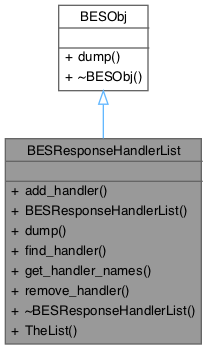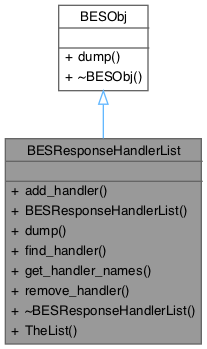List of all registered response handlers for this server. More...
#include <BESResponseHandlerList.h>


Public Types | |
| typedef std::map< std::string, p_response_handler >::const_iterator | Handler_citer |
| typedef std::map< std::string, p_response_handler >::iterator | Handler_iter |
Public Member Functions | |
| virtual bool | add_handler (const std::string &handler, p_response_handler handler_method) |
| virtual void | dump (std::ostream &strm) const |
| dump the contents of this object to the specified ostream | |
| virtual BESResponseHandler * | find_handler (const std::string &handler) |
| virtual std::string | get_handler_names () |
| virtual bool | remove_handler (const std::string &handler) |
Static Public Member Functions | |
| static BESResponseHandlerList * | TheList () |
Friends | |
| class | resplistT |
Detailed Description
List of all registered response handlers for this server.
A BESResponseHandlerList allows the developer to add or remove named response handlers from the list of handlers available for this server. For example, when the request 'get das for d1;' a response handler named "das" is looked up in the response handler list. Another example, 'show help;' would look up a response handler named "show".
What is actually added to the list are functions that instantiate the named response handler, not the response handler themselves.
- See also
- BESResponseHandler
- BESResponseObject
Definition at line 60 of file BESResponseHandlerList.h.
Member Typedef Documentation
◆ Handler_citer
| typedef std::map<std::string,p_response_handler>::const_iterator BESResponseHandlerList::Handler_citer |
Definition at line 76 of file BESResponseHandlerList.h.
◆ Handler_iter
| typedef std::map<std::string,p_response_handler>::iterator BESResponseHandlerList::Handler_iter |
Definition at line 77 of file BESResponseHandlerList.h.
Member Function Documentation
◆ dump()
|
virtual |
dump the contents of this object to the specified ostream
This method is implemented by all derived classes to dump their contents, in other words, any state they might have, private variables, etc...
The inline function below can be used to dump the contents of an OPeNDAPObj object. For example, the object Animal is derived from BESObj. A user could do the following:
Animal *a = new dog( "Sparky" ) ; cout << a << endl ;
And the dump method for dog could display the name passed into the constructor, the (this) pointer of the object, etc...
- Parameters
-
strm C++ i/o stream to dump the object to
Implements BESObj.
Friends And Related Symbol Documentation
◆ resplistT
|
friend |
Definition at line 70 of file BESResponseHandlerList.h.
The documentation for this class was generated from the following file: